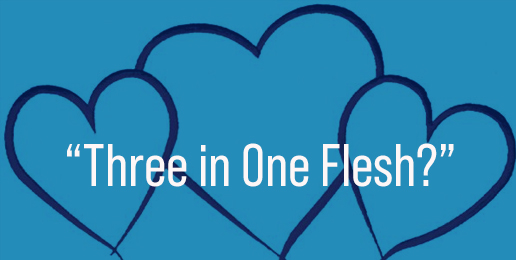
The “slippery slope” idea is sometimes a fallacy. But other times, it’s simply the way the world works. Concerned conservative Christians—the ones who warned us that legalizing one sexual perversion would lead to another down the road—were right. Say hello to polyamory, 2024.

A new Pew Research poll on the modern American family came out in September of last year and published alarming statistics on how the public views so-called “open marriages.” As it turns out, just over half of Americans under 30 say that “a marriage where both spouses agree that they can date or have sex with other people” is either somewhat or completely acceptable.
While the older age groups show a bit more residue of the biblical standard for marriage, their numbers aren’t that much more encouraging either. Adults aged 30–49 are split evenly, with 41% saying open marriages are acceptable and 41% saying they aren’t (17% say neither). And a full quarter of adults aged 50–64 agree that open marriages are acceptable as well.
As shocking as these stats may be to many of us even now, the cultural conversation about polyamory has been going on for decades already. A recent New Yorker article, published on Christmas Day of last year, chronicles some of the developments in society and pop culture that have led us to where we are today.
From the 1960s’ free-love movement Kerista, to the 1990’s polyamory-glamorizing magazine Loving More, to the succession of contemporary fiction books dramatizing the topic such as Luster (2020) and Acts of Service (2022)—not to mention the slough of celebrities and even non-celebrities whose adulterous escapades have floated through popular discourse over the past few decades—polyamory has occupied a corner in American society for several decades now.
And its breakthrough to the main stage of popular culture is now well underway.
It’s hard to read some of the justifications for polyamory that advocates have put forward over the years. Justifications that are tragically—and even humorously—stupid. According to the New Yorker, one polyamorous advocate in the 1990s characterized the practice as an important evolutionary process for the family, one that would help married individuals deal with the isolation or economic hardships they felt in society around them.
So, instead of having a spouse throw in the towel on marriage altogether, polyamory could be a necessary “release valve” for them to cope with any alienation they might be feeling.
As pervertedly odd as this justification might seem, it may be more relevant to today’s world than you might think: some are speculating that pandemic isolation prompted spouses—who supposedly were tired of being shut in with one person all the time—to branch out sexually as the world reopened.
Of course, the media has been characteristically unhelpful (to say the least) for the biblical cause of marriage. As the New Yorker observes:”Bored with the old-fashioned affair, prestige TV has traded in adultery for a newer, younger model, mining open relationships for drama.”
Always on the lookout for the next level of shock and scandal—because that’s what young minds lap up eagerly—the media seems to have selected polyamory to replace adultery as the new fodder for scandalous content. Which only serves to normalize it.
What are we to make of this trend? Not only are we getting the definition of marriage wrong on the sexual level—it’s no longer a man and a woman—but it’s only a matter of time before we start getting it wrong on the mathematical level when it no longer remains one man and one woman.
But, as theology professor Dr. Robert Gagnon observed at an IFI conference a few years ago, this is actually a display of logical consistency on the part of those who defy God’s institution of marriage. As he remarked:
“We’ve leapfrogged over incest and polyamory to get . . . permission for same-sex intercourse, eventually we’re going to have to circle back and be more internally consistent with our arguments. Because if there’s no particular significance to a male-female binary in God’s creation purposes, then why [would you limit] . . . the number of partners in a sexual union to two? If it’s adult, consensual, committed, loving, what’s your argument?”
I think he’s hit the nail on the head. Society is rapidly moving away from any definition of marriage that includes any external restriction on the core idol of erotic love. Two men can have sex—as long as they love each other. So why can’t three people—as long as they’re all consenting and loving, etc.?
Instead of submitting to the God who is love, and who, out of his love for us, instituted strict standards on how we can steward our erotic desires, we have turned the tables upside down. Love is now god, and it destroys all standards that would restrain it.
Despite the rosy portraits that polyamorous advocates would hold up for all to see, there is no escaping the fact that sex outside of the marriage covenant is adultery, plain and simple.
- A sin that God punished with death (Leviticus 20:10).
- A sin that destroys the picture of the fidelity between Christ and the church that marriage is intended to represent (Ephesians 5:25–32).
- A sin that rips open the exclusive union between the two who have become one flesh (Genesis 2:24) and pollutes the pure union of two souls who have pledged commitment to each other.
- A sin that relegates the profound familial and procreative realities of sex to a pick-me-up pastime to be engaged in with whomever. Not to mention a sin that will inevitably bring on the practical judgment of God in the here-and-now: just look up the historical rates of sexually transmitted diseases compared with today.
Lord, please call to account those who decorate abominations with gilded frames and entice others to follow them into the pit of depravity.
Topple the god of love that rules our culture—break off his head and hands as you did to Dagon so long ago (1 Samuel 5:4)—and turn the hearts of this people back toward You, who are truly Love.

























